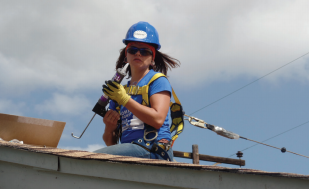Community Development Institutions
Guiding principles: Accessibility and Affordability, Compatibility and Integration, Community Engagement
Barriers addressed: Cost
Community Development Financial Institutions (CDFI) and Community Development Entities (CDE) are mission-driven financial institutions, corporations, or partnerships that serve and empower economically distressed communities. CDFIs and CDEs have access to and experience with affordable financing, government grants and tax credits, and technical assistance through the CDFI Fund and other government and nonprofit partners. CDFIs have historically led the development of affordable housing and small businesses in low-income communities and communities of color. Within the energy sector, CDFIs have emerged as critical partners and developers.
A notable example is Mountain Association for Community and Economic Development (MACED) in Kentucky. Recognizing a deep need by residents to reduce energy bills, MACED partnered with rural electric cooperatives to create an on-bill finance energy efficiency program that would allow homeowners to retrofit their homes at no cost, and repay the loan through their utility bill with a guaranteed rate of savings. In order to minimize risk, MACED created a loan-loss reserve fund that would provide full insurance to the cooperatives if any customers defaulted on their loans.
Whether providing direct investment dollars or credit enhancements, CDFIs can play a critical role in solar development. Potential incentives for CDFIs and CDEs include:
- The Community Reinvestment Act. This law requires financial institutions to meet the credit needs of the communities in which they operate. Institutions are reviewed by their regulatory authority to ensure they are supporting their local communities across the income spectrum. This incentivizes banks to offer more affordable loans to people and institutions that might otherwise be seen as higher risk.
- New Markets Tax Credit (NMTC). This tax credit provides tax savings to equity investors who invest in community development entities that will develop housing, catalyze economic development, and create jobs in low-to moderate-income neighborhoods. Given that solar creates economic development and opportunities for job creation and vocational training, NMTC can be a critical funding opportunity for shared and low-income solar projects, providing a 39 percent tax credit on projects over a seven-year period. These provide a consistent guaranteed return on investment within the seven years of a project, which can often be the payback period for solar programs. The NMTC is currently expired, however there are continual efforts in Congress to reintroduce it.
- Other. The CDFI Fund and other government institutions have many programs that offer grants, long-term capital, tax credits, and technical assistance to CDFIs and CDEs.






